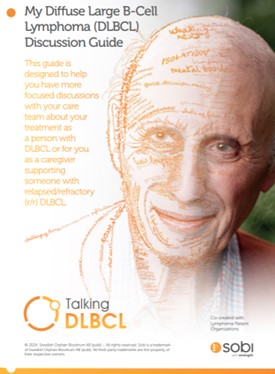Living with Diffuse Large B-Cell Lymphoma
Stephen shares his experience of living with multiple relapses of lymphoma
From breathlessness to diagnosis
Stephen is 58 years old and lives in Weybridge, Surrey, with his wife Liz and their two daughters. In May 2019, he was diagnosed with Non Hodgkin Lymphoma and later relapsed twice with DLBCL. The first signs were breathlessness while walking upstairs and a persistent cough - symptoms he later realised had been present for months, if not a year.
“I had what felt like low-level flu that never really went away,” Stephen recalls. “But when I became breathless, I knew something was wrong.” An X-ray revealed a mass in his chest. It took several more tests and biopsies to confirm the diagnosis - a tense 10-day wait, made even more difficult by trying to protect his children from knowing. “When the final diagnosis came, it was a shock, but also a strange kind of relief. The consultant had mentioned other possibilities like carcinoma or melanoma, so lymphoma was the best option out of a bad list.”
Breaking the silence and adjusting to life with cancer
Stephen and Liz carefully prepared to tell their daughters. “We practised what to say - that I had cancer, but it was going to be okay. We even took them with us to see the consultant to help them believe that there was hope.” Stephen went through treatment and experienced a period of remission, but his cancer later returned - twice. “The first relapse was horrible. The second time, I recognised the symptoms, so I wasn’t shocked. But we had a hard conversation with the consultant who told us the odds had changed.”- Despite the setbacks, Stephen felt confident in his care team at his clinic. “They were clear and honest - it wasn’t about sugar-coating. They told us the plan, and that gave us something to hold onto.”
The emotional impact on family and mental health
Throughout his journey, Stephen was acutely aware of the impact on his family. “You’re busy being ill. You’ve got doctors, nurses, things to do. But your family feels helpless - they want to fix it, and they can’t.” As time went on, the emotional toll deepened.
Stephen was diagnosed with PTSD (Post-traumatic stress disorder) following his second relapse. He retired from work and received psychiatric support and therapy. “Learning how to cope, how not to be overwhelmed by anger - that helped. It still sits inside you, but I’ve come out stronger.”
Facing relapse and finding hope
Stephen had three rounds of treatment and is now in remission. Although he acknowledges the trauma of relapse, he believes in the importance of hope.
“Lymphoma is serious, but it’s treatable. Every time, my consultants said, ‘We’re treating you with curative intent.’ That phrase stuck with me. There’s always another step.”
He also encourages others to seek support beyond medical appointments. “I relied too much on Google early on - big mistake. I now volunteer for Lymphoma Action and Blood Cancer UK. Their resources and forums are brilliant. I wish I’d found them sooner.”
Looking ahead with resilience and gratitude
Stephen now focuses on rebuilding life after retirement, enjoying time with family and volunteering. “It changed me. I’m more grateful than ever.”
He has this advice for others: “Don’t be afraid to ask your doctors questions. Trust them, but also advocate for yourself. Use the support around you. And remember - it’s tough, but you’re tougher than you think. I used to be the one in the family known for being a bit of a wimp. No one calls me that anymore.”
Talking DLBCL – see Stephens full Story here
Sobi would like to thank Stephen for supporting the development of this story.
Sobi’s DLBCL Right Words Campaign
DLBCL can sometimes return, and learning that previous treatments haven’t worked - or that the cancer has come back - can be overwhelming for both patients and their carers. That’s why Sobi, in collaboration with patients and carers, has developed educational materials designed to:
- Inform, support, and empower those affected by relapsed/refractory DLBCL.
- These resources aim to help patients reflect on their treatment needs and prioritise their healthcare goals.
- Prepare for meaningful conversations with their healthcare providers about the next steps in their care journey.

Diffuse large B-cell lymphoma (DLBCL)
We are a global biopharma company unlocking the potential of breakthrough innovations, transforming everyday life for people living with rare diseases.
Our therapies are concentrated within the areas of Haematology, Immunology and Specialty Care.
We contribute to societies by improving access to treatment of rare diseases.
Every day, we work actively to find better ways to understand and meet patient needs.
Find out more about our business and financial performance.
Here we present our most recent press releases, news articles, and images.
- About
- Therapeutic areas
- Medicines
- Stories
- Sustainability
- Careers
- Investors
- Media
- English
- Swedish